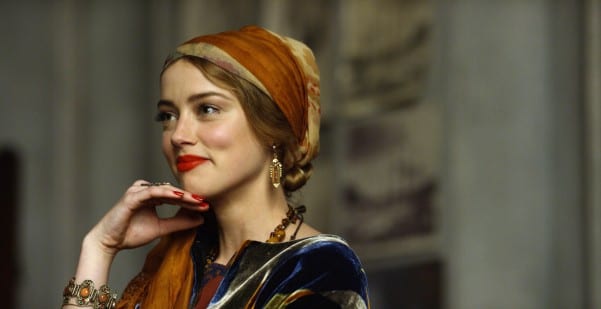
The Danish Girl stars the current best actor Oscar winner Eddie Redmayne as the transgender pioneer Lili Elbe, but for a lot of folks — including me — the emotional anchor of the film is Alicia Vikander’s amazingly fierce yet sensitive performance as Gerda, Lili’s wife before she transitioned in the 1920s and ’30s.
Vikander has had a remarkable year in cinema, with high-profile roles in four films (The Man from U.N.C.L.E., Burnt, Ex Machina and The Danish Girl — look for her name on the Oscar shortlist), but found time to sit down to talk about this film about a groundbreaking couple.
Dallas Voice: You’d had quite a year — the Dallas-Fort Worth Film Critics Association just gave you two awards for your films! Congrats! Alicia Vikander: Wow! Thank you, everyone in Dallas! … I know, it’s been quite a whirlwind — a lot of new experiences throughout this year. I’m trying to get my head around it.
Probably the most attention you’ve gotten is from The Danish Girl. How did the role reach you? I was on the tube in London and read the newspaper that Eddie [Redmayne] and [actor] Tom [Hooper] were going to make this, and I thought [as a filmgoer], “Wow, I’m really looking forward to seeing it.” Then my agent called me two days later and said, “You know, there’s a very good female role in it.” The script had been around for at least 15 years in the industry, and I had heard the Lili Elbe story mentioned before, [but didn’t know much about it].
I assume you had friends in the GLBT community, but you play someone before we even had the term GLBT or the vocabulary for transgender. How did you get in the mindset to play someone from another time? It’s interesting you say that — the “vocabulary.” [Doing the film] was extremely educational for me. I went to ballet school for nine years, so I did have a lot of gay friends coming out during my years there. [I would use] my fake ID with my gay friends [to get] into gay club and I met [trans people], but before we started to film, I didn’t have any close friends in the trans community. Learning the vocabulary [was very important]. We had some extraordinary people, some from the transgender community and people transitioning and people who stayed with their partners [after they transitioned]. There was one woman who brought an incredible book called My Husband is a Woman Now. She told me, “You can ask me anything you want.” It even took me a few minutes to warm up to ask, but that was an incredible insight.
The film is pitched as Lili’s story, but I have to say: Your performance really grounds it. I don’t think Lili would have existed with Gerda, which comes through via your work. I, too, was quite blown away [by Gerda]. It’s daunting to play someone [about whom] you ask, “How does she do that? How does she have such strength and emotional courage?” It’s hard to get emotionally right. But that was already on the page — to give, to support, to standby and step back. But to sacrifice [as Gerda does] can be consider passive, but she’s just not! She has the insight of knowing. Lili can’t choose — she is who she is. But Gerda does get to choose, and she chooses to stand by Lili. I wanted to show, of course, this emotional journey — that she knew that what she does in the right thing, even though knowing was [impossible]. Just imagine how tough it is today [to transition]. Now imagine how it would have been then, yet still to be seen and loved by somebody else. [The film is about] the emotional journey of these two people — about finding the amount of love to go through what they did when it was illegal and quite dangerous to do.















